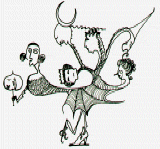|
Antique solid flame mahogany brass bound writing box circa 1830
Please click on images to enlarge | slide show | thumbnail
index |
Reference: WB479
Description:
WB479: Early 19th Century brass bound solid flame mahogany triple opening writing box with unusual features such as visible dovetail construction. It opens up to a green baize writing surface a high back with central oval framed mirror, spaces for storing papers, compartments for pens, inkwell and pounce pot, and other writing accessories. There is a nest of secret drawers under the pen tray.Circa 1830.
Origin: UK
Circa: 1830
Materials:
Size: 50 cm by 29.5 cm by 16 cm: 19.7 inches by
11.6 inches by 6.3 inches.
Condition: the wood
and patina are fantastic See images and comments below:
|

|

|
A
|
Please click on images to enlarge| slide show
| thumbnail
index | Request
current list of available writing boxes.

|
The box opens first
to a flat polished writing surface and a high back with central
oval framed mirror. The compartments for pens and inkwells is accessible
at this stage.
The back has hinge supports
which are more usual in boxes made in France.
|
The box then opens up to a green baize
writing surface, a high back with central oval framed mirror
|

|
Please click on images to enlarge| slide show
| thumbnail
index | Request
current list of available writing boxes.
The mirror although often a feature in dressing boxes is not usual in
a writing box. .I can only speculate the possibilities. Was
the owner a nervous spy who wanted to see behind them when writing? Or
did they write a diary in mirror image like Leonardo Da Vinci. Did they
just like looking at their own face for inspiration? Who
knows!
|

|

|
The lock is a later 19th c replacement. There are
marks in the wood near it which indicate that at sometime someone
forced it open. The asymmetrically shaped escutcheon is
unique!
|
Please click on images to enlarge| slide show
| thumbnail
index | Request
current list of available writing boxes.

|
Another unusual feature is that there are do side facings to
the writing surfaces as is usual in London work at the time.
|
Detail of the back: The oval mirror is inset and bordered
by a beading in white (maple) black (ebony) white. and framed with a
veneer of mitered quarter sawn mahogany.
|

|

|
The stained black solid wood pen tray, which is usual
for the period has an unusual profile.
|
Please click on images to enlarge| slide show
| thumbnail
index | Request
current list of available writing boxes.

|
The mirror panel opens down.
The joinery is not conventional.
|
There are two document drawers in the sides.
|

|
There are some signs of early repairs to the veneers
|

|
Please click on images to enlarge| slide show | thumbnail
index | Request
current list of available writing boxes.

|
There are a places for storing papers under the writing
flaps as is usual.
|

|
Under the accessory compartments there is a sprung
panel. separated by a contrasting maple divider.
|
Please click on images to enlarge| slide show | thumbnail
index | Request
current list of available writing boxes.
The lower panel is sprung and conceals secret drawers. The
release mechanism is much the same as that I have seen on many London made boxes of
the late 18th and early 19th Centuries.
|

|
Please click on images to enlarge| slide show
| thumbnail
index | Request
current list of available writing boxes.

|
A
|
The blown inkwell. and pounce pot are
period.
|

|
Please click on images to enlarge| slide show | thumbnail
index | Request
current list of available writing boxes.

|
The central brass plate is similar to the lock escutcheon and again
set asymmetrically.
|
Please click on images to enlarge| slide show
| thumbnail
index | Request
current list of available writing boxes.

|
The flame of the solid mahogany top is beautifully patinated with a
rich and interesting colour.
|
Please click on images to enlarge| slide show
| thumbnail
index | Request
current list of available writing boxes.
One of the most unusual features is the construction of the box
with evenly placed and proportioned dovetail. In London work of
the time it was usual to use full blind dovetails. The slight differences
in the widths of the dovetails indicate hand work with a saw and chisel.
|

|
Please click on images to enlarge| slide show
| thumbnail
index | Request
current list of available writing boxes.
Please click on images to enlarge| slide show
| thumbnail
index | Request
current list of available writing boxes.
Please click on images to enlarge| slide show
| thumbnail
index | Request
current list of available writing boxes.
Please click on images to enlarge| slide show
| thumbnail
index | Request
current list of available writing boxes.
Request
current list of available writing boxes.
News
| Buying
| email | Online
History of boxes | The
Schiffer Book |
All text and images and linked images are ©
1999-2009 Antigone Clarke and Joseph O'Kelly. If you require any further
information on permitted use, or a licence to republish any material, email us
at copyright@hygra.com
| 